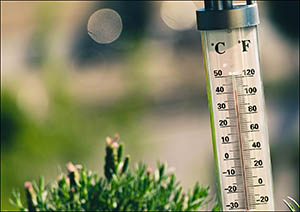High temperatures and heat-related issues make heat the biggest summertime weather hazard.
By Alison Crane
As the temperature rises, so does the need to take precautions and prevent heat-related problems. Unlike floods and tornadoes, the deadly damage caused by heat is often unrecognized because of its silent nature. High temperatures and heat-related issues make heat the biggest summertime weather hazard.
The human body has a built-in system for maintaining temperature. Varying the rate and depth of blood circulation, sweating, and even panting all serve to help maintain an average body temperature of 98.6 degrees. Unfortunately, the “dog days” of summer often make it where the body’s natural defenses are ineffective.
Having an awareness of symptoms related to each heat disorder and its seriousness can help prevent illness and protect against it becoming life-threatening. Heat exhaustion symptoms include cool, moist, pale, flushed or red skin, heavy sweating, headache, nausea or vomiting, dizziness, and exhaustion, but body temperature will be near normal. Take the person experiencing heat exhaustion to a cool place, give water, and monitor his/her condition. When in doubt, call 911.
Heat stroke occurs when the body’s temperature control system stops working. Signals include hot, red, and dry skin, changes in consciousness, rapid, weak pulse, rapid, shallow breathing, very high body temperature, dilated pupils, decreased blood pressure, increasing dizziness and weakness, headache, nausea or vomiting, loss of appetite, and mental confusion. Call 911. Move the person to a cool place and begin cooling the body while keeping him/her lying down.
While the dangers of summertime heat are very real, here are a few tips for increasing your heat safety:
- Drink plenty of water and avoid coffee, tea, and alcoholic beverages.
- Stay inside during the heat of the day.
- Dress for the weather – lightweight, light-colored clothing and hats, and sunglasses.
- Sunscreen – wear it and apply it often.
- Don’t forget your pets are affected by the heat and provide them with shade and cool water.
Be sure to check on the elderly, infants, young children, and people with chronic health conditions or disabilities. They are more vulnerable to the effects of heat.
For more information about staying safe and healthy this summer, contact the Garland County Extension Service at 501-623-6841 or visit our website at www.uaex.uada.edu/garland.
Alison Crane is a Family and Consumer Sciences Agent with the Garland County Extension Service. Pursuant to 7 CFR § 15.3, the University of Arkansas System Division of Agriculture offers all its Extension and Research programs and services (including employment) without regard to race, color, sex, national origin, religion, age, disability, marital or veteran status, genetic information, sexual preference, pregnancy or any other legally protected status, and is an equal opportunity institution.









